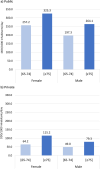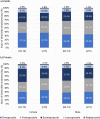Patterns of outpatient proton‒pump inhibitors use among older adults in a duplicative health system: comparing public and private prescribing
- PMID: 39762802
- PMCID: PMC11706009
- DOI: 10.1186/s12913-024-12033-5
Patterns of outpatient proton‒pump inhibitors use among older adults in a duplicative health system: comparing public and private prescribing
Abstract
Background: Proton-pump-inhibitors (PPIs) are overprescribed, posing challenges to patients and healthcare systems. In Portugal, the public National Health Service (NHS) provides universal coverage and reimburses medication regardless of prescription origin, i.e., public or private. This study aimed to compare PPIs outpatient prescription patterns and costs among older adults in the private and public sectors.
Methods: A nationwide retrospective ecological study was conducted on PPIs prescribed for older adults in Portugal from 2020-2022. Data on defined daily doses (DDDs) and prices were obtained from a national public database by healthcare sector, sex, and age group (65-74, ≥ 75 years). The market share of DDD per 1000 older adults per day and the mean price per DDD (€/DDD) for all PPIs substances were compared between the public and private sectors.
Results: PPIs-DDDs accounted for 5.3% of all outpatient DDDs prescribed in the private sector and 5.9% in the public sector. The private sector prescribed PPIs at a 20% higher price (0.126 €/DDD) than the public (0.106 €/DDD), with greater differences among the most expensive substances (rabeprazole, lansoprazole and esomeprazole). Omeprazole (cheapest) was mostly prescribed in the public sector. In the private sector, a similar pattern was observed among those aged ≥ 75 years, whereas esomeprazole was most prescribed for those aged 65-74 years.
Conclusions: Given the widespread prescription of PPIs and the associated cost, it is crucial to reinforce incentives to promote rational PPIs prescription and encourage deprescription when necessary, in both sectors. Since the NHS also reimburses medications prescribed in private units, implementing monitoring measures and financial incentives to promote responsible prescribing in this sector should also be considered.
Keywords: Overprescribing; Patterns; Private; Proton-pump inhibitors; Public; Rational prescribing.
© 2024. The Author(s).
Conflict of interest statement
Declarations. Ethics approval and consent to participate: Not applicable. This manuscript does not contain clinical studies or patient-level data. Data were derived from a publicly open access online platform of the Portuguese NHS; therefore, no access authorization was required. Consent for publication: Not applicable. Competing interests: The authors declare no competing interests.
Figures



References
-
- European Commission. Ageing Europe - Looking at the lives of older people in the EU. Eurostat 2020; 184.
-
- Chiatti C, Bustacchini S, Furneri G, et al. The Economic Burden of Inappropriate Drug Prescribing, Lack of Adherence and Compliance, Adverse Drug Events in Older People. Drug Saf. 2012;35:73–87. - PubMed
-
- Wallace E, Mcdowell R, Bennett K, et al. Impact of potentially inappropriate prescribing on adverse drug events, health related quality of life and emergency hospital attendance in older people attending general practice: A prospective cohort study. J Gerontol A Biol Sci Med Sci. 2017;72:271–7. - PMC - PubMed
Publication types
MeSH terms
Substances
LinkOut - more resources
Full Text Sources
Research Materials

